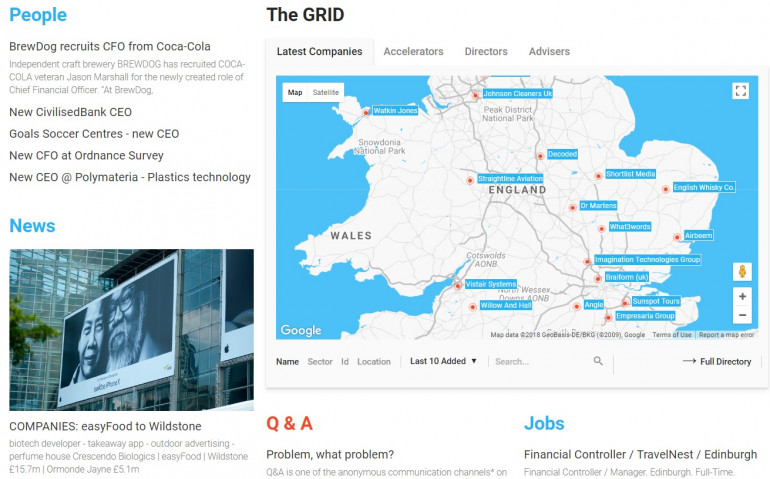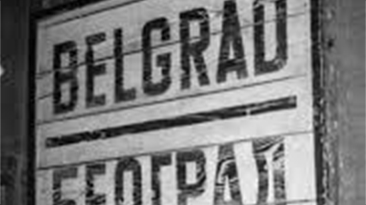Published by Directorzone Markets Ltd on July 24, 2017, 9:00 am in News, Other
Thursday February 14th 2019
EndsThursday February 14th 2019

Company news: Friska £4.6m | Evening Standard £71m | Organox | Skytime £6.5m | Sensewhere | Quiz | Graphcore
Fast food - Freesheet - Organ transplants -
Jet Charters - Positioning software -
Women's clothing - AI processors.
Media news digest about 7 UK growth companies / accelerators in the GRID marketplace 16th – 22nd July 2017:
FRISKA: healthy-eating fast-food chain - Gloucester
Feelgood foodies bulk up | Andrew Lynch, The Sunday Times. July 16
Directorzone profile: Friska Limited
Business: healthy-eating fast-food chain of eight outlets in Bristol and Birmingham …provides “feelgood food” using ethically sourced products, while supporting Third World entrepreneurs from the profits and relying where possible on renewable energy.
Launched: 2009
Location: Gloucester
Founders: Bath University economics graduates Griff Holland, 34, and Ed Brown, 31.
Financials: expects to turn over £4.6m this year
Investment: has sold a £3m stake to private equity - to allow it to embark on ambitious plans to expand - for an undisclosed minority stake last week with YFM EQUITY PARTNERS of Leeds, which has also backed the leisure brand GO OUTDOORS (since sold to JD SPORTS).
News:
1. Friska — which means healthy in Swedish — plans to open at Manchester Science Park in the autumn, followed by outlets in the city’s central business district.
2. The former WAGAMAMA chief Steve Hill, who chairs the Vietnamese food chain Pho, becomes chairman.
EVENING STANDARD: free daily newspaper - London
London paper profits fall | The Sunday Times. July 16
Directorzone profile: Evening Standard Limited
Business: freesheet, now edited by George Osborne
Launched: 1827
Founder: barrister Stanley Lees Giffard. Both The Standard and the Evening Standard were acquired by C. Arthur Pearson in 1904. Later owners: Daily Express owner, Lord Beaverbrook (1923); Daily Mail owner, Lord Rothermere; Express Newspapers; Associated Newspapers. In 2009, the Russian businessman and former KGB agent Alexander Lebedev and his son Evgeny Lebedev, owners of The Independent, take 64 percent ownership (12 percent Justin Shaw and Geordie Greig; Associated News 24 percent).
Location: London W8
Financials: Profits dropped by a third last year, reported underlying profits of £2.2m in the 12 months to October — against £3.3m the previous year. Advertising revenues held steady at £71m, but the Standard increased its circulation to more than 1m — pushing up overheads. The bill for distributing the paper across London rose from £11.5m to £12.9m.
Investment: ...controlled by Evgeny Lebedev, the son of Russian tycoon Alexander Lebedev. THE DAILY MAIL AND GENERAL TRUST, former owner, retains a 25% stake.
UPDATE:
Mystery investor bought 20% of Evening Standard parent | Cynthia O’Murchu and Andrew Edgecliffe-Johnson, FT. January 30, 2019
1. ...just over 20 per cent stake sold for nearly £14m in LEBEDEV HOLDINGS – which owns nearly 90 per cent of the Evening Standard - in December to an investor whose identity is concealed behind a Cayman Islands company and was incorporated two days before the deal
2. In 2017 a 30 per cent stake in The Independent’s digital operations was sold to a relatively unknown Saudi investor, Sultan Mohamed Abuljadayel. Mr. Abuljadayel works Saudi Arabian investment bank NCB Capital, which owns Saudi Research and Marketing Group, which in turn signed a licensing deal with The Independent creating four news websites, publishing content in Urdu, Turkish, Persian and Arabic in 2018.
3. Lebedev Holdings - which include London-based television station London Live - had net liabilities of more than £135.7m for year ending September 2017, up from £117.8m in 201 ...and has been heavily reliant on financial support through loans from Mr Lebedev. In March last year Mr Lebedev increased his stake in the Evening Standard from 65 per cent 89 per cent, following a financing deal that saw the stake owned by the publisher of the Daily Mail being diluted to 10 per cent.
ORGANOX: organ transplant technology - Oxford
London paper profits fall | The Sunday Times. July 16
Directorzone profile: Organox Limited
Business: Oxford University spinout on a mission to stop donated organs going to waste. Was founded by two university professors, developed a device that can keep donors’ organs alive and healthy while they wait for a recipient. It means fewer livers and other organs will be thrown away, fuelling hopes that fewer people will die while waiting for a transplant. OrganOx’s device has already been involved in 220 liver transplants conducted by the NHS.
Launched: 2008
Location: Oxford
Staff: Craig Marshall, 54, chief executive
Investment: is raising £7m in fresh investment. It has previously raised £17m from investors and is planning a stock market listing in the next two years.
News: will use the cash to fund a trial in the US. “About a quarter of people on the waiting list are not able to have a transplant, and die,” said Marshall
SKYTIME: jet charters - Cheltenham
Our private jets soared after we were grounded | Laura Onita, The Sunday Times. July 16
Directorzone profile: Skytime Jets Limited
Business: jet charter firm. Skytime charters flights for companies and customers with deep pockets… more usually successful business folk who want to be flown to the racing at Cheltenham or Ascot in a helicopter, according to James. Flights range from £2,000 to £800,000. Skytime, which now has six staff, takes a fee for every flight it books — about 2,000 a year. Although customers can make an inquiry online, they can’t book a flight instantly.
Launched: 2012
Location: Gloucestershire airport near Cheltenham
Founders: James and Kelly Shotton had been working for European Skytime, a supplier of private planes to wealthy individuals, before it collapsed. After two weeks fretting, the Shottons decided to target their former employer’s customers — and use a similar name, Skytime. They used £20,000 of savings to launch a website and employ three people. Two months later their venture was profitable.
Financials: Last year it made pre-tax profits of £314,000 on sales of £6.5m and revenues are expected to grow 40% this year.
Investment: They own it 100% and plan to expand without external investment.
SENSEWHERE: indoor positioning software - Edinburgh
Tech firm secures £1.4m funding to develop indoor positioning software | Steve Vance, Invest Edinburgh in City A.M. July 17
Directorzone profile: Sensewhere Limited
Business: a technology firm which started life as a spin-out from the UNIVERSITY OF EDINBURGH has developed world-class indoor positioning software. Sensewhere has developed technology that uses signals from indoor electromagnetic sources like Wi-Fi routers and Bluetooth to pinpoint a user’s location in areas like shopping centres and airports – where GPS signals from satellites are weak or blocked. Sensewhere’s software is now being used by companies in sectors such as social media, gaming, retail, advertising and mapping. Its customers include satnav specialist TOMTOM and TENCENT, China’s biggest internet services company and a major investor in sensewhere.
Launched: 2009
Location: Edinburgh HQ. Its international offices are in Mountain View, California, China’s capital Beijing, and Shenzen in south-east China. The company’s original office was in the City of Edinburgh Council’s joint incubator with the Shenzhen Municipal Government.
Founder: Rob Palfreyman, chief executive and co-founder, who spent nine years in semiconductor manufacturing in the US and another two years in location technology businesses before setting up sensewhere with chief technology officer Tughrul Arslan and vice president of engineering Zankar Sevak.
Staff: employs 24 staff worldwide, including 18 at its head office on Edinburgh’s Princes Street. The new jobs are being created in engineering roles covering areas such as big data, cloud development, location technology and software development.
Investment: TENCENT, China’s biggest internet services company and a major investor in sensewhere. £1.4m grant funding from Scottish Enterprise will support research and development.
News:
1. “We’ve got more than 600m monthly active users,” Palfreyman says. “It’s a global service, so it can be used wherever a device is being used in the world. It’s important that users can navigate around complex indoor spaces.”
2. “It’s important for marketers to be able to share marketing information with people based on their location. It’s also important for emergency services to know where people are. Our technology also supports social web services, chat apps and gaming navigation.”
3. The opportunity is to touch everyone who uses a mobile device with the company’s location software. “This is a truly global positioning solution that is highly scalable and low cost. The potential market is huge. Location-based advertising alone was worth $11.3 billion in 2016.”
QUIZ: women's clothing - Glasgow
Women's clothing brand to float on London Stock Exchange next week | William Turvill, City A.M. July 20
Directorzone profile: Tarak International Limited
Business: Womenswear retailer trading as Quiz ....through its website or apps, and in store. Focused on women’s “occasion wear and dressy casual wear” for 16-35-year-olds and has adopted “fast fashion” processes that allow it to bring designs into shops quickly. ...has 73 standalone stores and 165 concessions in the UK and Ireland. …present in 19 countries through 65 international franchise stores, concessions, wholesale partners and international online partners.
Launched: 1993
Location: Glasgow
Founder: managing director, Tarak Ramzan
Staff: employs 1,350 people across the UK and Ireland. Peter Corgill, the chairman of JD SPORTS has been brought in as non-executive chairman
Investment: will enter the Alternative Investment Market (AIM) on 28 July , has successfully raised £102.7m and will be valued at £200m when it enters AIM. Some £92.1m of the proceeds will go to selling shareholders and £10.6m will go towards the company, which joins peers such as ASOS and BOOHOO on the market.
News:
1. The company is aiming to open 20 new stores and 20 new concessions in the UK over the next two years.
UPDATE:
Quiz Clothing soars on IPO to reach £245m market value | Hannah Murphy, FT. July 29
2. shares rise 20% after the second-biggest primary fundraising on London’s junior Aim market this year. Just over half of the company, 51.2 per cent, is now in public hands. The listing is the first to be brokered by PANMURE GORDON since the struggling London stockbroker was taken over earlier this year by Atlas Merchant Capital, the investment firm of former Barclays chief executive Bob Diamond, and the investment vehicle of the Qatari royal family.
3. While small in comparison, it will rival the likes of online retailers Asos, now up more than 30,000 per cent to £58.53 since its listing in 2001, and Boohoo, whose shares have risen 360 per cent to 233p since it first floated in 2014. Asos and Boohoo are valued at £4.85bn and £2.68bn respectively.
Fashion brand Quiz finds the love | Sabah Meddings, The Sunday Times. July 8 2018, 12:01am,
4. ...is turning Instagram followers into sales. Gabby Allen unveiled as the new face of the Glasgow-based retailer after appearing in the Love Island TV series last year. With more than 1m followers on Instagram, the 26-year-old is an attractive marketing tool.
5. posted sales of £116.4m last year, and analysts expect the figure to exceed £150m in 2019. The firm is also debt-free and cash-generative.
6. makes 45% of its clothes in British factories, allowing it to have new designs on shop rails and on its website within two weeks. Many of the rest are made in China, with a six-week lead time. By testing designs before placing big orders, its buying team is able to limit the chances of being left with piles of unpopular outfits at the end of the season
7. ... still very much a bricks-and-mortar retailer, with 71 stores in Britain and 147 concessions. It manages the risk by keeping leases short; on average, less than three years remaining. Helpful flexibility while the high street is under pressure.
8. ...impressive plans for overseas expansion, which should largely be driven by online growth.
GRAPHCORE: AI processors - Bristol
Graphcore lands $30m from top AI experts Demis Hassabis from Deepmind, Uber's Zoubin Ghahramani and more along with Atomico and others | Lynsey Barber, City A.M. July 20
Directorzone profile: Graphcore Limited
Business: makes high-end chips that can be put into computers to make them faster at crunching data. The chips are specifically designed to accelerate machine learning, otherwise known as AI. Graphcore was earlier this year named one of the most disruptive startups in the world. In the same way that graphic processing unit (GPU) chips support the graphics performance on devices such as smartphones, Graphcore's intelligence processing unit (IPU) chips support machine learning in things like driverless cars and are much more powerful.
Location: Bristol
Founder: Nigel Toon
Investment: $30m (£23m) raise only in October last year. New round of $30m investment, which was led by VC firm ATOMICO with some of the world's leading experts in artificial intelligence are among fresh investors:: Google DeepMind founder Demis Hassabis and Zoubin Ghahramani, Uber's chief scientist and Cambridge university professor. AI experts Greg Brockman, Ilya Sutskever, Pieter Abbeel, Scott Gray from research group OpenAI are aso investing in the latest round. Existing investors also participated. They include AMADEUS CAPITAL, ROBERT BOSCH VENTURE CAPITAL, C4 VENTURES, DELL TECHNOLOGIES CAPITAL, DRAPER ESPRIT, FOUNDATION CAPITAL, PITANGO and SAMSUNG CATALYST FUND. ARM founder Herman Hauser is also an early investor in the firm.
News:
1. Hassabis, said: “Building systems capable of general artificial intelligence means developing algorithms that can learn from raw data and generalise this learning across a wide range of tasks. This requires a lot of processing power, and the innovative architecture underpinning Graphcore's processors holds a huge amount of promise."
2.Atomico partner Siraj Khaliq will join the Graphcore board. He said: "Graphcore’s first IPU delivers one to two orders of magnitude more performance over the latest industry offerings, making it possible to develop new models with far less time waiting around for algorithms to finish running. In that sense, the IPU doesn't just accelerate code, it should help developers accelerate the pace of innovation itself.”
UPDATE:
UK AI chip startup Graphcore lands millions from top Silicon Valley investor Sequoia Capital | Lynsey Barber, City A.M. November 13, 2017
3. SEQUOIA CAPITAL, which has previously backed Apple, Google and WhatsApp, has led a $50m (£38.2m) funding round in Graphcore. The series C comes hot on the heels of a previous round of cash in July from several of the world's top AI experts - Google DeepMind founder Demis Hassabis and Zoubin Ghahramani, Uber's chief scientist and Cambridge university professor, among them - but the new cash will accelerate the startups growth. It aims to ship its first Intelligence Processing Unit (IPU) at the start of next year. Sequoia ….was an early backer of US chip maker NVIDIA, which is moving into AI processors from graphics processors for gaming. Also participating in the latest round are the existing investors.
4. In the same way that graphic processing unit (GPU) chips support the graphics performance on devices such as smartphones, Graphcore's IPU chips support machine learning in things like driverless cars...
UK chipmaker Graphcore raises $50m from Sequoia | Aliya Ram, FT. November 13, 2017
5. Companies that run artificially intelligent algorithms currently use standard graphics processing chips. Technologies that use machine learning techniques require faster speeds to enable vast amounts of data to be crunched more quickly. Graphcore’s new chips are designed specifically to power machine learning systems and have up to 100 times more processing power than standard chips.
6. Nigel Toon, chief executive of Graphcore - who sold ICERA, his previous company, to US-based Nvidia for $367m in 2011 - said that Graphcore planned to become an independent listed business in the UK rather than selling to a rival. Mr Toon, 53, is a veteran of the chip industry. Before Graphcore, the electrical engineering graduate ran PICOCHIP, a Bath-based semiconductor group, which is now owned by Intel, and XMOS, another Bristol-based chip company.
7. Graphcore’s deal with Sequoia brings the company’s total fundraising in the past 13 months to $110m. The company said it planned to use the new investment to hire staff for its new office in Silicon Valley. ...probably be a new office in China “in the very near future”.
Chipmaker Graphcore becomes unicorn as £200 million funding paves way for float | Mark Shapland, The Evening Standard. 18 December 2018
8. ...has become the latest UK tech unicorn after raising $200 million (£159 million) in new funding as it works towards a stock-market float. ....today’s funding values the company at $1.7 billion, meaning it joins fintech firms Monzo and Revolut as the latest UK companies to earn unicorn status. Unicorns are private companies valued at more than $1 billion.The round saw BMW and MICROSOFT join the investor base, while existing investors Dell Technologies and Robert Bosch Venture Capital also took part. Goldman Sachs was brought in to advise.
9. Chief executive Nigel Toon said an IPO could take place within the next two years, providing liquidity for its investors and employees, although he refused to set out an exact timeline.
10. ...plans to use the money to open offices in Beijing and Hsinchu, Taiwan. Since its last financing a year ago its staff has increased from 75 to 200.
11. Toon argues that the chips designed for the PC age, mostly made by Intel and Nvidia, are no longer good enough, adding that more tailored solutions are required to achieve better speed. The chips are particularly useful for power-intensive tasks such as AI in cloud computing as well as for autonomous vehicles. Graphcore’s customers include DELL and SAMSUNG and the company says it plans to hit $50 million in revenue next year.








